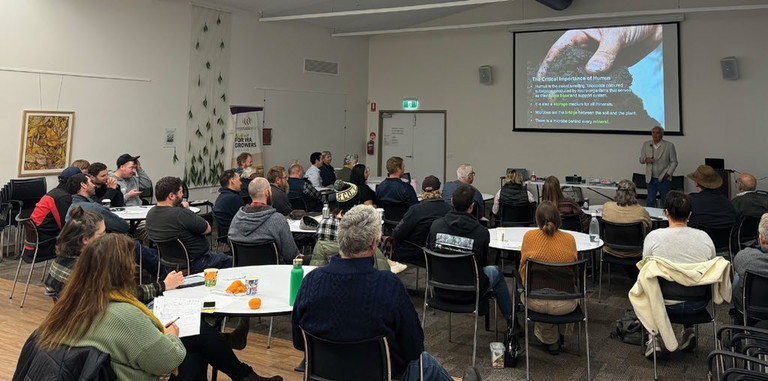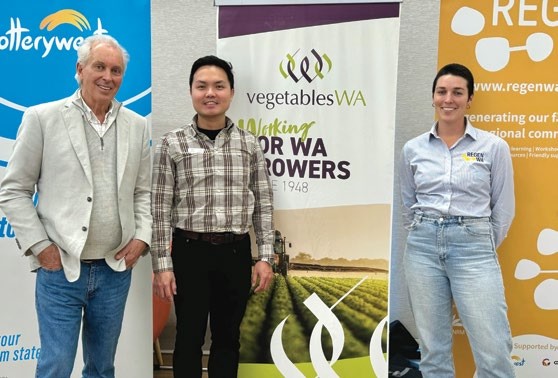FEATURE workshops

NUTRITION
FARMING WORKSHOPS
in Manjimup and Gingin
Throughout August, vegetablesWA held Nutrition Farming Workshops in Manjimup and Gingin, where over 70 growers and industry professionals came together to learn from Graeme Sait, an expert in regenerative agriculture.
Words Chi Nguyen
THE workshops attracted a diverse group, including vegetable growers, winemakers, orchardists, and livestock farmers, all eager to explore new ways to improve soil and plant health.
Graeme’s passion for regenerative farming was a hit with everyone. He covered important topics like soil nutrients, mineral interactions, cover crops, in-field testing, organic matter, and foliar fertilisation in an engaging and easy-to-understand way. The discussions were great, and the energy in the room was incredible. We even ran overtime because everyone was so engaged, and no one wanted the session to end.
Feedback we received from attendees after the workshops has been overwhelmingly positive. Many growers are keen to see more events like this in the future, with some asking for longer workshops and practical field days where they can get hands-on experience with soil and plant testing in real farm environments. The interest in regenerative practices is growing, and growers are excited about the potential benefits it could bring to their operations.

Graeme Sait, Chi Nguyen (vegetablesWA) and Carrie Taylor (regenWA).
These workshops were made possible thanks to funding from APC VPC for vegetablesWA extension project, RegenWA, Perth NRM with funding from Lotterywest, the State Natural Resources Management Program, and Commonland. We also thank to the Southern Forests Food Council and the South-West WA Drought Hub for supporting the Manjimup workshop.
If you would like more information or have ideas for future events or trials, please reach out to Chi Nguyen via chi.nguyen@vegetableswa.com.au. We look forward to continuing the conversation and helping you improve soil health and sustainability through future events.
The importance of soil and leaf testing
Soil and leaf tests provide valuable insights, but it’s important to understand that the mineral profiles of leaf tests often don’t match those from the corresponding soil tests. This can happen for several reasons, including:
• Complex mineral interactions within the soil.
• Reduced nutrient availability due to environmental factors, such as dry conditions limiting uptake of water-soluble nutrients, or hard pans restricting root growth.
• Nutrient uptake being hindered by root diseases or pests.
• Healthy organic matter levels counteracting soil imbalances.
Because of these factors, it’s often essential to conduct both soil and leaf tests.
Combining these tests allows you to identify potential soil-based problems and make informed decisions about nutrient supplementation and soil amendments.
Key benefits:
• Adjusting soil inputs or even omitting them when leaf nutrient levels are high.
• Foliar spraying essential elements when soil levels are already high, helping avoid further soil imbalance.
Regular soil and leaf testing can enhance nutrient management, leading to healthier crops and more efficient use of inputs.